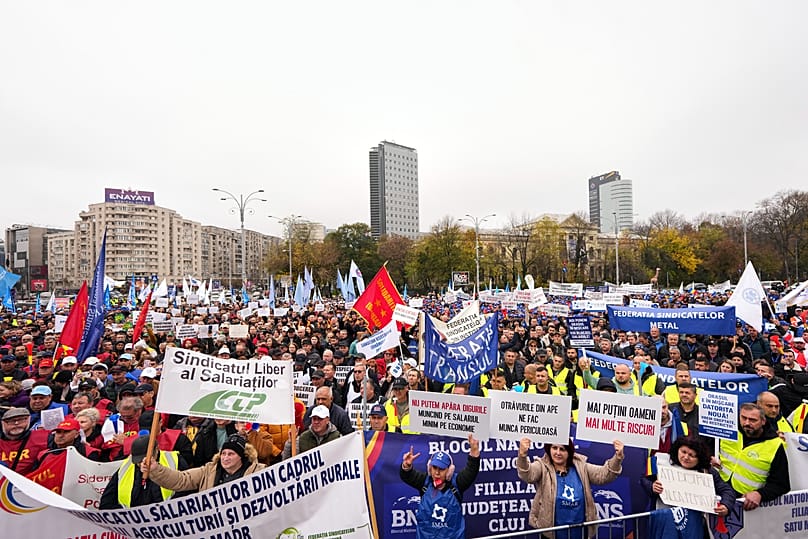The rally was organised by the National Trade Union Bloc, made up of dozens of professional federations and comes as Romania’s government pursues measures to reduce the budget deficit.
Thousands of protesters marched in Bucharest on Wednesday to demand higher wages, measures to curb inflation and tax reductions for workers as the government pushes on with austerity to tackle the country's large budget deficit.
 ADVERTISEMENT
ADVERTISEMENT
 ADVERTISEMENT
ADVERTISEMENT
Protesters gathered outside government headquarters in Romania's capital, then marched toward the Palace of Parliament.
They honked horns and banged drums and some held placards that read: "We want decent salaries" or "Don't hit those who save you," the latter accompanied by a photo of an ambulance worker.
The rally was organised by the National Trade Union Bloc, made up of dozens of professional federations and comes as Romania's government pursues measures to reduce the budget deficit.
It stood at over 9% in 2024, one of the highest in the 27-nation European Union.
Romania has agreed with the EU to reduce the deficit to 8.4% this year.
Government austerity measures include tax hikes, public sector wage and pension freezes and cutting public spending and public administration jobs.
"Workers are once again being sacrificed for their jobs — even though we work harder, we are getting poorer," the union bloc said in a statement. "The impoverishment of the population has become state policy."
The bloc later said it had been invited by the ruling parties for discussions.
Protesters also seek an end to public sector job cuts and intensified efforts to combat tax evasion.
"Income tax has exceeded all imagination, reaching 43% of our salaries. Almost half goes to the state," one of the protesters told Euronews Romania.
"The watchword today is: respect our work," said another.
"We see that prices have gone crazy lately, inflation has risen, and purchasing power has fallen. They took again from those who go home and have put food on the table for their children."
When Romania's governing coalition was voted in earlier this year, it pledged to make reducing the budget deficit and reforming state institutions a top priority.
Cristian Andrei, a Bucharest-based political analyst, said the government will struggle to close the economic gap without significant upheaval, because it failed to deliver "fast and decisive reform measures" and lost public support.
"The perception now is that only regular people are struggling, not people (at the) top," he said.
"There is already a lot of fear from politicians of making more cuts or reforms. Unions are just one voice of this choir."
















